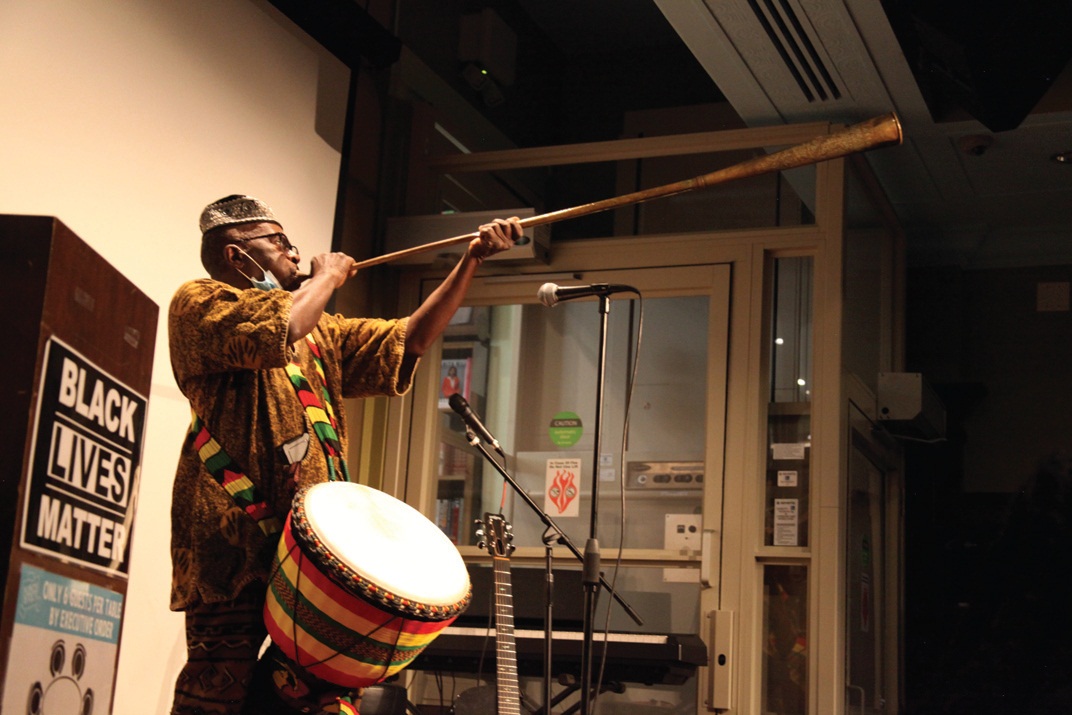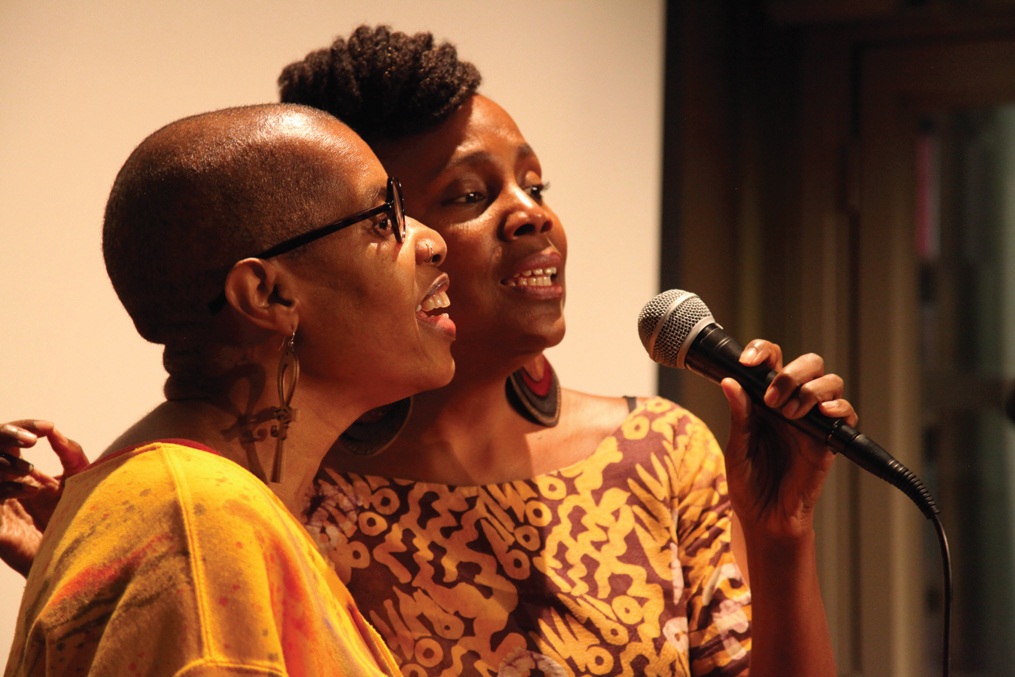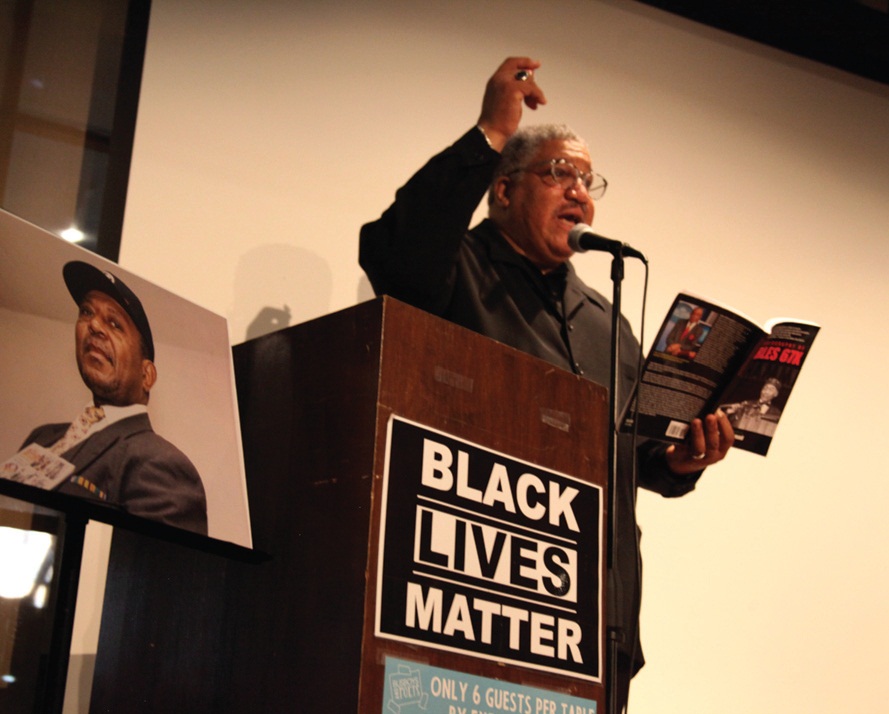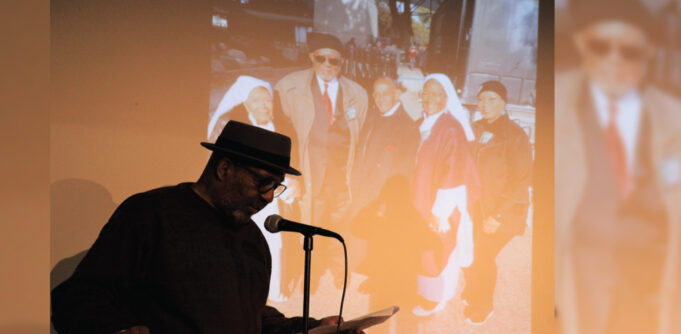WASHINGTON—Broadcast live on D.C.-based WPFW and WABI in New York, “Each other’s Dreams: Celebrating the Life and Legacy of Askia Muhammad” was much more than a memorial service. His magnificent spirit filled the Afrocentric Busboys and Poets restaurant in Washington, D.C., on March 5 when poetry, music, visual images, and memories celebrated his life.
This was a celebration of life worthy of a king. Indeed, Askia Muhammad would have been proud. Speakers honored Mr. Muhammad in the Angela Davis room for his outstanding work and positive influence. With people paying their respect, they packed the joint to the rafters. Mr. Muhammad was described as a gentle giant whose influence was far and wide. One of his favorite sayings was, “We must believe in each other’s dreams.”
A regular on WPFW Radio for 40 years, Mr. Muhammad hosted a weekly show and served as news director. In addition to writing for Black-owned newspapers like the Washington Informer, he was senior editor at The Final Call, published by the Nation of Islam. He spent 28 years as a White House correspondent. Mr. Muhammad was the first Muslim editor in chief of the legionary Muhammad Speaks newspaper. At 76, he died of natural causes in his Washington, D.C., home.



Jamil Muhammad, a student minister in the Nation of Islam and co-host with Askia Muhammad on his weekly jazz program “Yard Bird Sweets,” opened the program. As is the custom of the Muslims, he passed out candy peppermints asking attendees to remember the sweetness of the man while reading a poem from Mr. Muhammad entitled “Sweet Memories,” and the program began. Student Minister Jamil Muhammad also informed that a Jananza prayer service was held in the historic Masjid Muhammad on March 3.
Askia Muhammad was not just a legendary journalist; he was also an accomplished poet, jazz historian, and photographer. A spiritual vibration filled the air in the venue as his poetry was read, making those in attendance smile without any hesitation. “He was nobody’s slave,” one speaker said. Another noted he was “a front-line brother.” Bobby Hill, an associate at WPFW, during remarks said Mr. Muhammad “redeemed my soul.”
Bringing the spirit of Allah (God) to the room were Free Benjamin and Ayanna Gregory, who sang the anthems of two African nations. Listening to their music reverberated to the bone, causing goosebumps all around as their songs gave way to pure joy.
In pouring libations, Nana Kwabena Brown reflected that the meaning of Askia’s name is “powerful” and “complete.” His gemstone is a diamond.
Reflections and poems were read by Lorne Cress, the sister of Francis Cress Welsing, and Sonia Sanchez. Joseph Ngwa gave a moving drum recital. He also blew the kakaki African brass horn, and a violin tribute was presented by Mr. Muhammad’s grandson Ishmael Holness.
A musical tribute honored Mr. Muhammad, followed by moving remarks by his children, Raafi Rivero, and Naderah Moreland.
Roland Martin, the famed journalist, was also present despite having a prior engagement.
“If there is any way to honor a brother, someone who truly believed in Black liberation, we ought to continue what he did. When you think about the history of Black media, Douglass, Ida B. Wells, Chuck Stone, and Ethel Payne—folks were here for a specific period of time and did what they were supposed to do. I dare say Askia was one of those voices,” said Mr. Martin.
“There is a difference between some people present and those who had a presence in this life. Those who left no fingerprints or no footprints. I dare say Askia was not just present but had presence, and our job is to do what he did, hold people to task, and hold each other accountable,” he added.
Journalist Susan Goodwin, who is White, described her relationship with Mr. Muhammad over the years. “This was a chance to hear within context stories and appreciation of what Askia’s career has meant to Black journalism, to journalism as a whole to radio, but also coupled with that, his deep, deep faith in family,” she told The Final Call. “And to hear those two things together, it just made me even prouder than I’ve ever been to be a journalist because I got to work with him,” she said.
Katea Stitt, WPFW program director, gave The Final Call insight into the program’s planning. “We wanted to celebrate him with a cultural celebration. We know Akia was of course a journalist of the highest order, a radio personality of the highest order, a producer. But, we also know he was a fantastic poet. We also know that he was a musicologist, an ethnomusicologist. The purpose of the ceremony was to take a moment to honor all that Askia Muhammad represents,” said Ms. Stitt.
“You know we have said over and over again that we loved him and thanked him for loving us with integrity in the deepest, the blackest way possible,” she continued.
Jamil Muhammad summarized the program and tribute best. “It was a surprise. Although I knew it would be good, I did not realize how rich and multilayered it would be. It served as a memorial and reunion for people essential to helping him and us achieve the great mission he lived for. So, it was a great event,” he stated.
“You think of a man whose work literally spanned the globe and who was respected in countries around the world, in South Africa, in South America, in the Caribbean, really in the whole of Africa,” noted the longtime student minister and helper.
“He was a powerful communicator, and he will be missed in his physical presence, but his aura, spirit, and power will endure for years to come. His heart was filled with love for Allah, Islam, and the Honorable Minister Louis Farrakhan,” Student Minister Jamil Muhammad concluded.














